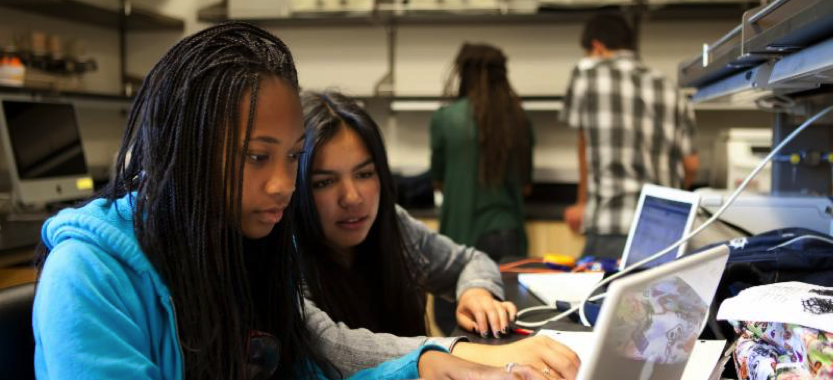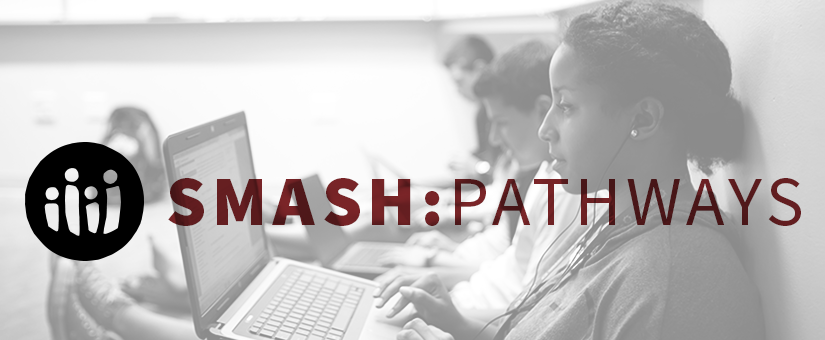…a world where a true level playing field exists – a world where everyone has equitable access to opportunities, including the historically disenfranchised.
This level playing field would start in our educational system. Disparities in resources, high-quality teachers, rigorous courses, and technology would not exist. All students, regardless of race/ethnicity, economic background, parent education level, or neighborhood would be provided with opportunities to excel academically, access rigorous courses, and be prepared to apply to, and graduate from, top colleges and universities across the United States. As a result, our communities and workplaces would benefit from well-prepared, competitive leaders representing broad perspectives and sectors of society.
LPFI provides the resources and support to ensure that underrepresented students of color throughout our nation can overcome barriers and obstacles to their success and thrive in STEM fields of study, from K-12 through higher education.
This level playing field would start in our educational system. Disparities in resources, high-quality teachers, rigorous courses, and technology would not exist. All students, regardless of race/ethnicity, economic background, parent education level, or neighborhood would be provided with opportunities to excel academically, access rigorous courses, and be prepared to apply to, and graduate from, top colleges and universities across the United States. As a result, our communities and workplaces would benefit from well-prepared, competitive leaders representing broad perspectives and sectors of society.
LPFI provides the resources and support to ensure that underrepresented students of color throughout our nation can overcome barriers and obstacles to their success and thrive in STEM fields of study, from K-12 through higher education.
Level Playing Field Story
Founded by Freada Kapor Klein in 2001, LPFI was first known as the “Institute for Inclusive Work Environments.” Frustrated by the inability of the for-profit world to foster diversity and having already spent nearly three decades consulting to organizations on issues of discrimination and diversity, Freada aimed to tackle the problem from a different vantage point. She created a non-profit institute to rigorously and creatively address why diversity efforts had failed and more significantly, to examine and implement programs to understand and experience how diversity could succeed. Upon a foundation of improving civility, fairness, and opportunity in workplaces, the Level Playing Field Institute was established.
Broadening the Vision: IDEALIn addition to addressing workplace issues, Freada’s concern about the plight of underserved, underrepresented students of color in higher education fueled the creation of new educational programs. The first of these, the Initiative for Diversity Education and Leadership, IDEAL, was founded in response to the passage of Prop 209 during her tenure on the Executive Board of the College of Letters and Science at UC Berkeley with three of her colleagues . The IDEAL program helped students navigate and graduate from higher education systems by providing students with scholarships and mentorship.
Developing a Pipeline of Young Scholars: SMASH Recognizing the need for a pipeline of highly qualified Bay Area scholars who are prepared for college, LPFI started assessing the opportunities that students from well-resourced schools have; we then sought to close the gap as much as possible for Bay Area students of color without those resources. For example, small classes, high expectations, customized college counseling, and field trips are all part of the educational experience for students from well-resourced schools.
Broadening the Vision: IDEALIn addition to addressing workplace issues, Freada’s concern about the plight of underserved, underrepresented students of color in higher education fueled the creation of new educational programs. The first of these, the Initiative for Diversity Education and Leadership, IDEAL, was founded in response to the passage of Prop 209 during her tenure on the Executive Board of the College of Letters and Science at UC Berkeley with three of her colleagues . The IDEAL program helped students navigate and graduate from higher education systems by providing students with scholarships and mentorship.
Developing a Pipeline of Young Scholars: SMASH Recognizing the need for a pipeline of highly qualified Bay Area scholars who are prepared for college, LPFI started assessing the opportunities that students from well-resourced schools have; we then sought to close the gap as much as possible for Bay Area students of color without those resources. For example, small classes, high expectations, customized college counseling, and field trips are all part of the educational experience for students from well-resourced schools.
The Summer Math and Science Honors (SMASH) Academy, launched in 2004; a program inspired by and loosely modeled after Phillips Academy Andover’s Math and Science for Minority Students [(MS)2]. Using (MS)2 as a model, SMASH launched a residential summer program in 2004 at UC Berkeley. In 2006 we added a year-round academic program, based on student requests. In 2007, we saw 100% of our first class of scholars apply to and enter college. In 2011 we expanded to Stanford, followed by the launch of academies at UCLA and USC in 2012. In the summer of 2015, LPFI launched the SMASH:Pathways UC Davis program.
A Continuum of Educational Opportunities in STEM
Today LPFI has positioned itself to provide a continuum of STEM education programs, from middle school through college enrollment. LPFI runs its high-touch science, technology, engineering, and math (STEM) education programs for under-represented students (students of color, low-income students, and first generation students, primarily), a research program focused on examining inequity for under-represented students in STEM, and exciting computer science (CS) initiatives, like Level the Coding Field hackathons, as well as SMASH:Connect, our alumni mentoring program. Today, LPFI serves more than 600 students annually.
A Continuum of Educational Opportunities in STEM
Today LPFI has positioned itself to provide a continuum of STEM education programs, from middle school through college enrollment. LPFI runs its high-touch science, technology, engineering, and math (STEM) education programs for under-represented students (students of color, low-income students, and first generation students, primarily), a research program focused on examining inequity for under-represented students in STEM, and exciting computer science (CS) initiatives, like Level the Coding Field hackathons, as well as SMASH:Connect, our alumni mentoring program. Today, LPFI serves more than 600 students annually.
Level Playing Field Institute (LPFI) is on the cusp of greatness. We aspire to become the premier STEM equity organization in California and across the United States. In my first year as Executive Director, I worked with our Board and team to create an ambitious roadmap, determining where LPFI is going and why. This organizational mapping brought bold yet strategic programming enhancements, which included an increased focus on computer science (CS).
Latinos and African Americans combined comprise just 6% of the technology workforce in the Bay Area. But the low numbers do not begin there. They begin as early as elementary and middle school and continue into high school. The astonishingly low numbers of underrepresented students taking the AP CS exam in California – due primarily to the lack of access to CS courses in public high schools – serves as one example of the clear opportunity gap and became LPFI’s primary call to action.
In California last year, of the 4964 students who took this exam only 74 were Black, 385 were Latino, and 1074 were female: a mere one third of the state’s total test taking population. LPFI is committed to changing these statistics and has already taken two notable steps in this direction: 1) We were awarded our first ever National Science Foundation “Broadening Participation” grant and, 2) we launched two new CS projects: Level the Coding Field hackathons and Camp Code.
Thanks to our NSF award and new CS projects, hundreds more of California’s underrepresented students will be exposed to CS and prepared to take and pass the AP exam. I am heartened by our CS advances and their potential to help shift a longstanding paradigm.
Latinos and African Americans combined comprise just 6% of the technology workforce in the Bay Area. But the low numbers do not begin there. They begin as early as elementary and middle school and continue into high school. The astonishingly low numbers of underrepresented students taking the AP CS exam in California – due primarily to the lack of access to CS courses in public high schools – serves as one example of the clear opportunity gap and became LPFI’s primary call to action.
In California last year, of the 4964 students who took this exam only 74 were Black, 385 were Latino, and 1074 were female: a mere one third of the state’s total test taking population. LPFI is committed to changing these statistics and has already taken two notable steps in this direction: 1) We were awarded our first ever National Science Foundation “Broadening Participation” grant and, 2) we launched two new CS projects: Level the Coding Field hackathons and Camp Code.
Thanks to our NSF award and new CS projects, hundreds more of California’s underrepresented students will be exposed to CS and prepared to take and pass the AP exam. I am heartened by our CS advances and their potential to help shift a longstanding paradigm.
STEM
by Danielle Rose, Director of Programs for the Level Playing Field Institute
STEM fields are some of the most exciting areas to work in today. Not only are STEM careers at the cutting edge of discovery and innovation, they are also among the most sought after jobs. According to the 2015 US News & World Report rankings, 13 of the top 15 best jobs are STEM related. These jobs are not only good for those who hold them but for the nation as a whole.
Unfortunately, many STEM careers are placed out of reach for people from underrepresented communities of color. This is evidenced by the employment data recently released by many major tech companies.
This data indicates that while African Americans and Latinos make up make up 30 percent of the US population, they represent less than 5 percent of the tech workforce.
This gap in diversity is the product of an access and leaky pipeline problem to STEM. By pipeline problem we mean that students from underrepresented communities lack access to the resources, classroom instruction and opportunities that are essential to successfully begin a path to a STEM career. The pipeline becomes leaky when biases, both overt and covert, drive these students to abandon their dream of a future in STEM.
At the Level Playing Field Institute (LPFI), we seek to remedy these pipeline issues by living up to our mission by eliminating the barriers faced by underrepresented people of color in STEM and fostering their untapped talent for the advancement of our nation.
We do this through our signature program, the Summer Math and Science Honors Academy, better known as SMASH. SMASH is a free, STEM-intensive, college preparatory program for low-income underrepresented high students of color. Operated on the campuses of Stanford, UC Berkeley and UCLA, SMASH boasts a rigorous 5-week, 3-year summer residential STEM enrichment program. SMASH scholars are provided access to rigorous coursework, developmental workshops,mentors, role models, and support networks. Our programs aren’t just inspirational; they are transformational.
The results of SMASH speak for themselves:
You can help LPFI break down the barriers for these students with an investment of your time and/or resources. Learn how you can get involved at LPFI.org.
STEM fields are some of the most exciting areas to work in today. Not only are STEM careers at the cutting edge of discovery and innovation, they are also among the most sought after jobs. According to the 2015 US News & World Report rankings, 13 of the top 15 best jobs are STEM related. These jobs are not only good for those who hold them but for the nation as a whole.
Unfortunately, many STEM careers are placed out of reach for people from underrepresented communities of color. This is evidenced by the employment data recently released by many major tech companies.
This data indicates that while African Americans and Latinos make up make up 30 percent of the US population, they represent less than 5 percent of the tech workforce.
This gap in diversity is the product of an access and leaky pipeline problem to STEM. By pipeline problem we mean that students from underrepresented communities lack access to the resources, classroom instruction and opportunities that are essential to successfully begin a path to a STEM career. The pipeline becomes leaky when biases, both overt and covert, drive these students to abandon their dream of a future in STEM.
At the Level Playing Field Institute (LPFI), we seek to remedy these pipeline issues by living up to our mission by eliminating the barriers faced by underrepresented people of color in STEM and fostering their untapped talent for the advancement of our nation.
We do this through our signature program, the Summer Math and Science Honors Academy, better known as SMASH. SMASH is a free, STEM-intensive, college preparatory program for low-income underrepresented high students of color. Operated on the campuses of Stanford, UC Berkeley and UCLA, SMASH boasts a rigorous 5-week, 3-year summer residential STEM enrichment program. SMASH scholars are provided access to rigorous coursework, developmental workshops,mentors, role models, and support networks. Our programs aren’t just inspirational; they are transformational.
The results of SMASH speak for themselves:
- 100% of SMASH alumni graduate from high school;
- 75% complete an AP STEM course;
- 98% have gone to college or university and nearly half of those to a top-50 school; and
- 74% declare a STEM major, compared to 23% of all college freshman
You can help LPFI break down the barriers for these students with an investment of your time and/or resources. Learn how you can get involved at LPFI.org.






